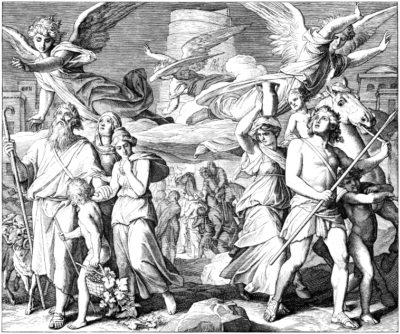If the earth be the Lord’s, then, wherever a child of God goes, he does not go off his Father’s ground.
—Matthew Henry, Commentary on the Whole Bible (1712)
Jeremiah walked about the city with a wooden yoke strapped across his neck. It was a visual message. God’s people were under the yoke of Babylon. They were to submit to it lest greater judgment fall (Jer. 27). Jerusalem’s subjugation to Babylon and the deportation of many of her citizens were judgments from God, severe chastisements for her sins. Now Jerusalem needed to kiss the rod and submit to God’s discipline and His long-term plan for His people.
But the message was hard to swallow. The Babylonians were evil. They were also pagan idolaters. Their civilization and culture was born a worldview completely at odds with that of Scripture. For Babylon was New Babel, Babel reborn. The ziggurat that stood in the city-center, a tower recently refurbished by Nebuchadnezzar, testified in looming architectural terms to the Mesopotamian philosophy of the continuity of being and its political concomitant, the tyranny of one-world State. How could — why should — God’s people ever submit to such an ideological monstrosity or to the life of such a hell-born community and government?
When We Don’t Like the Message . . .
In time, one of Jerusalem’s prophets, a man named Hananiah, had had enough of Jeremiah’s negative message. He decided that Jerusalem needed a happier vision for the future, so he told the people that the partial captivity was about to end, that all their family and friends who had been carried away would soon be home again. Jeremiah protested that such a happy prophecy was inconsistent with God’s normal covenantal dealings.
The prophets that have been before me and before thee of old prophesied both against many countries, and against great kingdoms, of war, and of evil, and of pestilence. The prophet which prophesieth of peace, when the word of the prophet shall come to pass, then shall the prophet be known, that the LORD hath truly sent him (Jer. 28:8-9).
But Hananiah was undeterred. He plucked the yoke from Jeremiah’s neck and broke it in pieces. “Thus says Yahweh, “ he proclaimed, “so shall I break the yoke of Nebuchadnezzar, king of Babylon, from the neck of all nations within the space of two full years” (v. 11).
A Letter from Yahweh
Jeremiah went his way, but God came to him later and thoroughly denounced Hananiah’s false prophecy. God sentenced Hananiah to death for the lies he had uttered in God’s name. Then God told Jeremiah to write a letter to the people in captivity.
In this letter, God told His captive people that their time in Babylon would be long — 70 years, in fact. Most of them would never see Jerusalem again. Because of this, they needed to settle down. Build houses, God said. Plant gardens, get married, have children, and “seek the peace of the city whither I have caused you to be carried away captives, and pray unto the LORD for it: for in the peace thereof shall ye have peace” (29:7).
Jeremiah’s letter met with protest in Babylon. There, too, men who fancied themselves prophets bristled at Jeremiah’s message. How could Yahweh possibly say such a thing? Jeremiah was obviously crazy and ought to be restrained (vv. 24-32). God pronounced judgment on those false prophets, too.
The Ancient City
In order to appreciate Jeremiah’s message and make proper application, it’s important that we understand the religious nature of the pagan city. Fustel de Coulanges wrote at length on exactly this topic in his classic work, The Ancient City (1864). His focus was the city-states of Greece and Rome, but was he said of these was also true of the ancient cities of Mesopotamia or Canaan. He tells us, for example, that “the foundation of a city was always a religious act” (134).
Surrounded by a sacred enclosure, and extending around an altar, it was the religious abode of gods and citizens. Livy said of Rome, “There is not a place in this city which is not impregnated with religion, and which is not occupied by some divinity. The gods inhabit it.” What Livy said of Rome any man might say of his own city; for if it had been founded according to the rites, it had received within its walls protecting gods who were, as we may say, implanted in its soil, and could never quit it. Every city was a sanctuary; every city might be called holy (141).
War, death, family, law — everything the city did as a city was by nature religious. “There was not a single act of public life in which the gods were not seen to take a part” (163).
Thus, in time of peace, as in war time, religion intervened in all acts. It was everywhere present, it enveloped man. The soul, the body, private life, public life, meals, festivals, assemblies, tribunals, battles, all were under the empire of this city religion. It regulated all the acts of man, disposed of every instant of his life, fixed all his habits. It governed a human being with an authority so absolute there was nothing beyond its control (166).
The ancient city knew nothing of a conflict between church and State because
. . . the state was enslaved by its religion; or, rather, the state and religion were so completely confounded, that it was impossible even to distinguish the one from the other. . . (167).
What was true of Athens and Rome was most certainly true of Babylon. Its life and culture were inescapably religious, and that religion was wholly idolatrous.
The Church in Exile
And yet the Babylonian Captivity was a key part of God’s plan for the redemption of the world. The dispersion of God’s people throughout the empire and beyond spread the word of God to the four corners of the known earth, brought thousands of Gentiles to faith in God, and prepared both the Jewish church and the world at large for the advent of Christ and the spread of the New Testament Church.
So when God sent His people to Babylon, He sent them as ambassadors, witnesses, teachers, synagogue planters and prayer warriors. The world was His, and the Captivity was a new tactic in His war against the sin and darkness that had invaded it.
What was true then is true now. The civil and social claims of Jesus Christ trump the religious commitments, the dogmas, and the idolatrous rites of any given city’s rulers or populace. All authority in heaven and earth is His (Matt. 28:18). Every city is His. The claims of the idols, and of the demons behind them, are nothing. God’s people don’t compromise or contaminate themselves when they participate in the civil life of a city that Jesus Christ has already claimed for Himself. In fact, Christ has commanded His people to be involved: to witness, preach, baptize, disciple, set up churches, ordain elders, pray, serve, work, save, invest and give. Jesus wants the cities of this world to know His peace.
The Peace of the City
When Jeremiah spoke of peace, he used the word shalom. “Shalom is comprehensive peace. It means order, health, safety, harmony, well-being, happiness, wholeness, and completeness.” When God commanded His captive people to pray for the peace of Babylon, to seek its welfare, he was telling them to ask God for all these things. He was telling them to do all the things that would make for such shalom.
Making modern application, Philip Ryken writes, “Seeking the peace of the city means being a good neighbor. It means shoveling the sidewalk. It means cleaning the street. It means planting a tree. It means feeding the poor. It means volunteering at the local school. It means greeting people at the store. It means driving safely and helping people with car trouble. It means embracing people from every ethnic background with the love of Christ.”
Of course, all of this by itself is nothing. As Ryken clearly points out, “By themselves, random acts of kindness cannot bring a peace that endures.” The foundation and fountain of all true peace is Jesus Christ, crucified and risen. We best seek the peace of our city when we bear witness to the Prince of Peace and His gospel of peace. Without this, all our good works and best wishes degenerate into social gospel rooted in and powered by the flesh.
Praying for Peace
Our prayers for our city ought to be shaped by this reality. Our prayers should be Gospel-oriented. They should be Christ-centered.
First, we should pray for the financial stability and well-being of our city. We should pray that there will be work for those who want it and charity for those who need it. We should pray for the businesses and industries that fuel our local economy — that they would prosper; that they would function ethically; that they would, directly and indirectly, be a blessing to the church. The church needs funding and a degree of financial stability to function well. Its members need work.
Second, we should pray for the safety of the city. We should pray that God would spare our city from the destruction wrought by tornadoes, hurricanes, earthquakes and drought. We should thank God for domestic peace and pray that He will continue to restrain injustice, violence and lawlessness within our city’s borders. We should pray that He will protect us from enemies without and within. The church puts down roots and grows in influence when she is physically safe (Jas. 3:18).
Third, we should pray for the officials of our city mayors, councilmen, and department heads. We should pray for our police officers and our firefighters. We should pray for their safety, their effectiveness, and their submission to the Gospel, so that we “may lead a quiet and peaceable life in all godliness and honesty” (1 Tim. 2:1-4).
Fourth, we should pray for the people of the city. We should pray that the Gospel will reach every soul; that the churches will be faithful in their worship and witness; that whole families and neighborhoods will turn to Christ and know His peace. We should pray for revival, renewal and reformation.
Conclusion
Ryken writes, “Whatever shalom the Hebrews offered to Babylon, Christians are able to offer a much greater peace to the postmodern city.” God’s people in Babylon moved in terms of shadows and types, of prophecies and unfulfilled promises. We have the reality. Christ has come. The Lord is risen. We have the Good News of true peace for men and nations, for time and eternity.
For Further Reading
Fustel de Coulanges, The Ancient City (Garden City, NY: Doubleday Anchor Books, [1864]).
Philip Graham Ryken, Courage to Stand: Jeremiah’s Battle Plan for Pagan Times (Crossway Books, 1998).
Philip Graham Ryken, “God’s Heart for the City,” Faith and Reason Forum, https://www.faithandreasonforum.com/index.asp?PageID=9&ArticleID=26.











